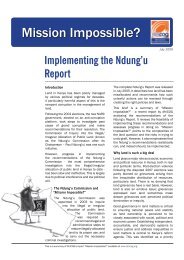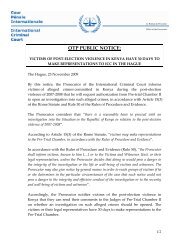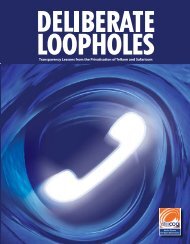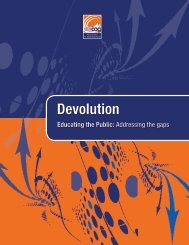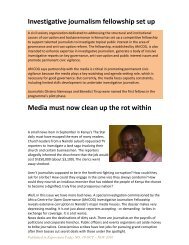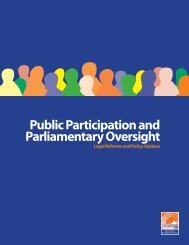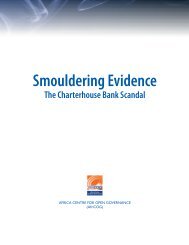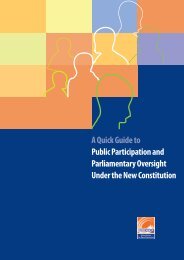Untitled - Africa Centre for Open Governance
Untitled - Africa Centre for Open Governance
Untitled - Africa Centre for Open Governance
Create successful ePaper yourself
Turn your PDF publications into a flip-book with our unique Google optimized e-Paper software.
Devani and several other suspected co-conspirators were charged with various counts of stealing<br />
but by the time the scandal broke, he had fled the country. The Government then sought the help<br />
of Interpol to track him down.<br />
His arrest and expected extradition was a significant development in view of the fact that, in a way,<br />
he epitomizes the culture of prominent persons getting away with economic crimes in Kenya.<br />
Mr. Devani enjoyed good political connections. As AfriCOG reported in its publication “An Analysis<br />
of the Triton Oil Scandal”, <strong>for</strong> example, a ceremony to open Triton’s LPG depot in 2006 was attended<br />
by several political bigwigs, including then Vice-President Moody Awori, several cabinet ministers<br />
at the time, such as Hon. Raila Odinga, Hon. Uhuru Kenyatta and several permanent secretaries.<br />
The company’s past transactions with the Government also tend to support the widespread<br />
perceptions of links with key political players. During the regime of President Daniel arap Moi,<br />
Triton clinched the lucrative contract to supply petroleum products to the KPLC several times. It<br />
was the local partner of The Reliance Consortium (led by India’s largest private telecom service<br />
provider, Reliance Telecoms), which was poised to take up the second national telecom operator<br />
license in 2007 <strong>for</strong> KES 12 billion. Triton was also among the firms named in Parliament as having<br />
received large loans from Charterhouse Bank in contravention of banking regulations and in what<br />
was suspected to have been money laundering. 57 Complaints from other oil marketers strongly<br />
suggest that Triton Ltd had an undue advantage over other players in the use of KPC facilities<br />
as it reportedly often held stocks that took up as much as half the space at Kipevu Oil Storage<br />
Facility, well above its market share, which is the determining factor in allocating storage space to<br />
companies.<br />
AfriCOG expressed concerns regarding the handling of<br />
the Charterhouse Bank issue by the relevant government<br />
ministries and parliamentary committee in its report,<br />
Smouldering Evidence: The Charterhouse Bank Scandal. The<br />
report takes issue with the collective amnesia displayed by<br />
public institutions summoned be<strong>for</strong>e the Parliamentary<br />
Committee which, just a few years prior, had instituted<br />
investigations into the bank and recommended its closure.<br />
These institutions suddenly appeared to have no problem<br />
with the Bank being reopened despite the fact that there<br />
had been no resolution of the issues that led to its closure.<br />
AfriCOG also found it disturbing that the Parliamentary<br />
Committee seemed to be lobbying <strong>for</strong> the re-opening of<br />
a bank in spite of continuing investigations.<br />
Acknowledgment<br />
AfriCOG is grateful to the UNDP Amkeni Wakenya programme who have supported<br />
the production of this report. However, the opinions contained in it are those of<br />
AfriCOG. AfriCOG also thanks the Department <strong>for</strong> International Development (DFID<br />
UK), the <strong>Open</strong> Society Initiative <strong>for</strong> East <strong>Africa</strong> (OSIEA), the Embassy of Finland and<br />
The Tides Foundation <strong>for</strong> their support to our work.<br />
AfriCOG is indebted to its Board of Directors, Stella Chege, John Githongo, Maina Kiai,<br />
Duncan Okello and Funmi Olonisakin. As always, we thank our dedicated team <strong>for</strong><br />
their hard work; Charles Wanguhu, Maureen Kariuki, Robert Nizigama, David Nyende,<br />
Noreen Wahome, Yvonne Owino, Carole Theuri, Consolata Wangechi, Anyona Obutu,<br />
Rosemary Tollo and Michael Orwa. This report was produced with the assistance of<br />
Faith Makau, George Kegoro and Maina Mutuaruhiu.<br />
<strong>Africa</strong> <strong>Centre</strong> <strong>for</strong> <strong>Open</strong> <strong>Governance</strong><br />
P. O. Box 18157-00100, Nairobi, Kenya.<br />
Telephome: +254 20-4443707 / 0737463166<br />
Email: admin@africog.org<br />
Website: www.africog.org<br />
Smouldering Evidence<br />
The Charterhouse Bank Scandal<br />
cf. AfriCOG, “Smouldering Evidence. The Charterhouse Bank Scandal,” http://www.<br />
africog/reports/smouldering_evidence_the_charterhouse_bank_scandal.pdf<br />
57 AfriCOG, “Smouldering Evidence: The Charterhouse Bank Scandal” http://www.africog.org/reports/Smouldering_<br />
Evidence.pdf (June 2011)<br />
25




